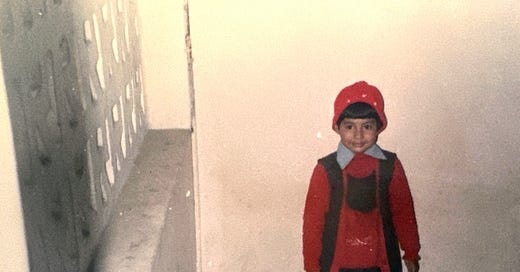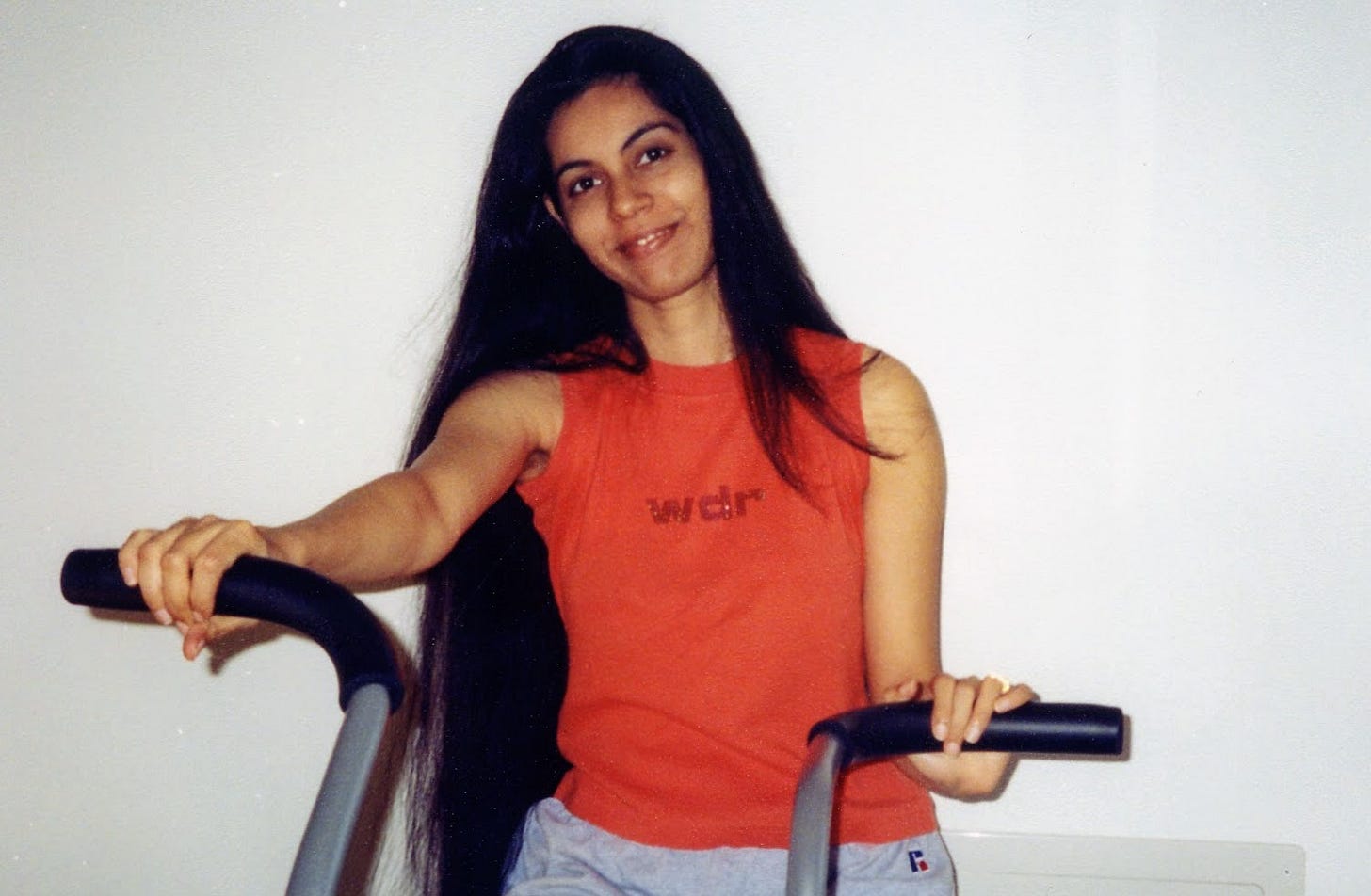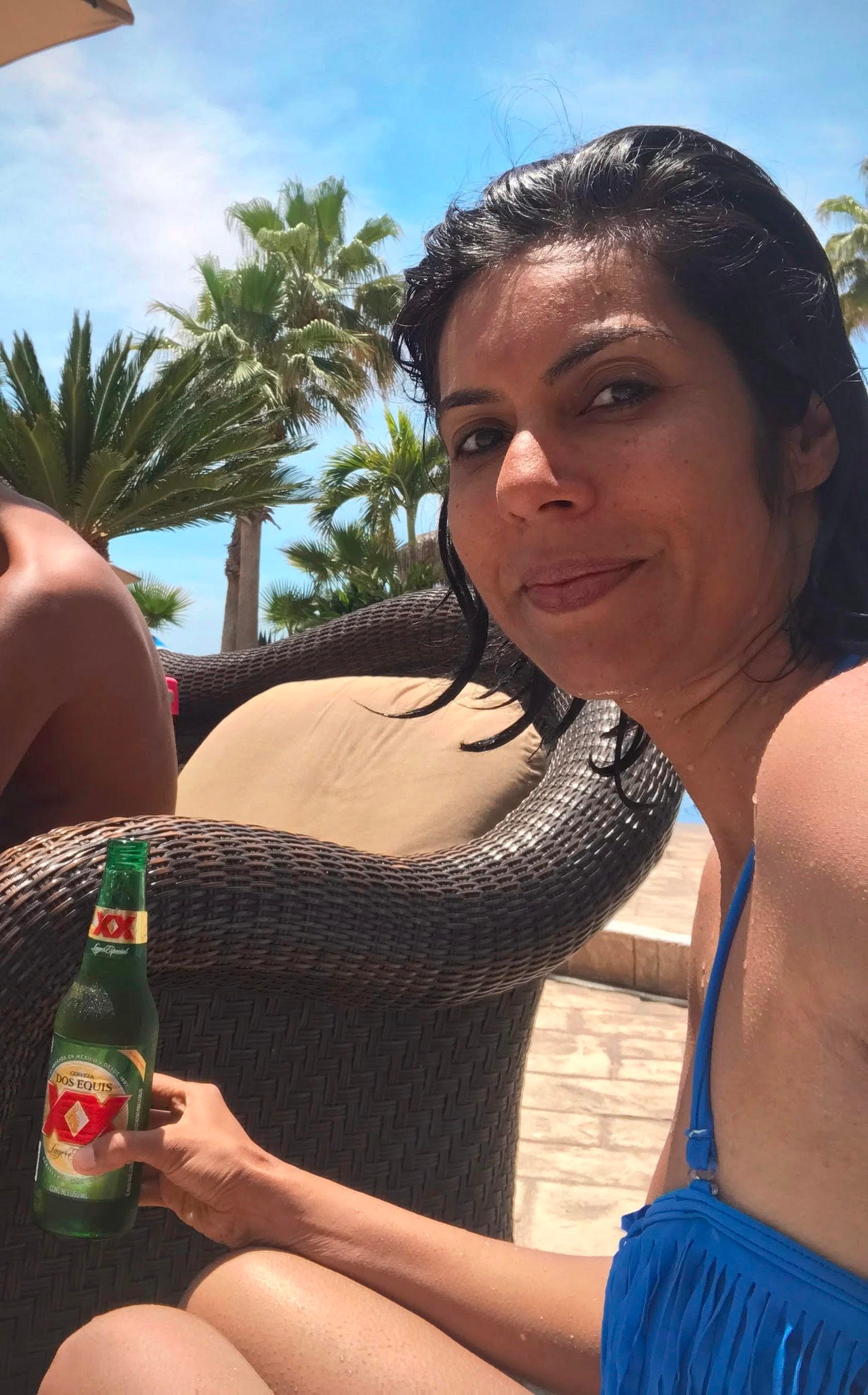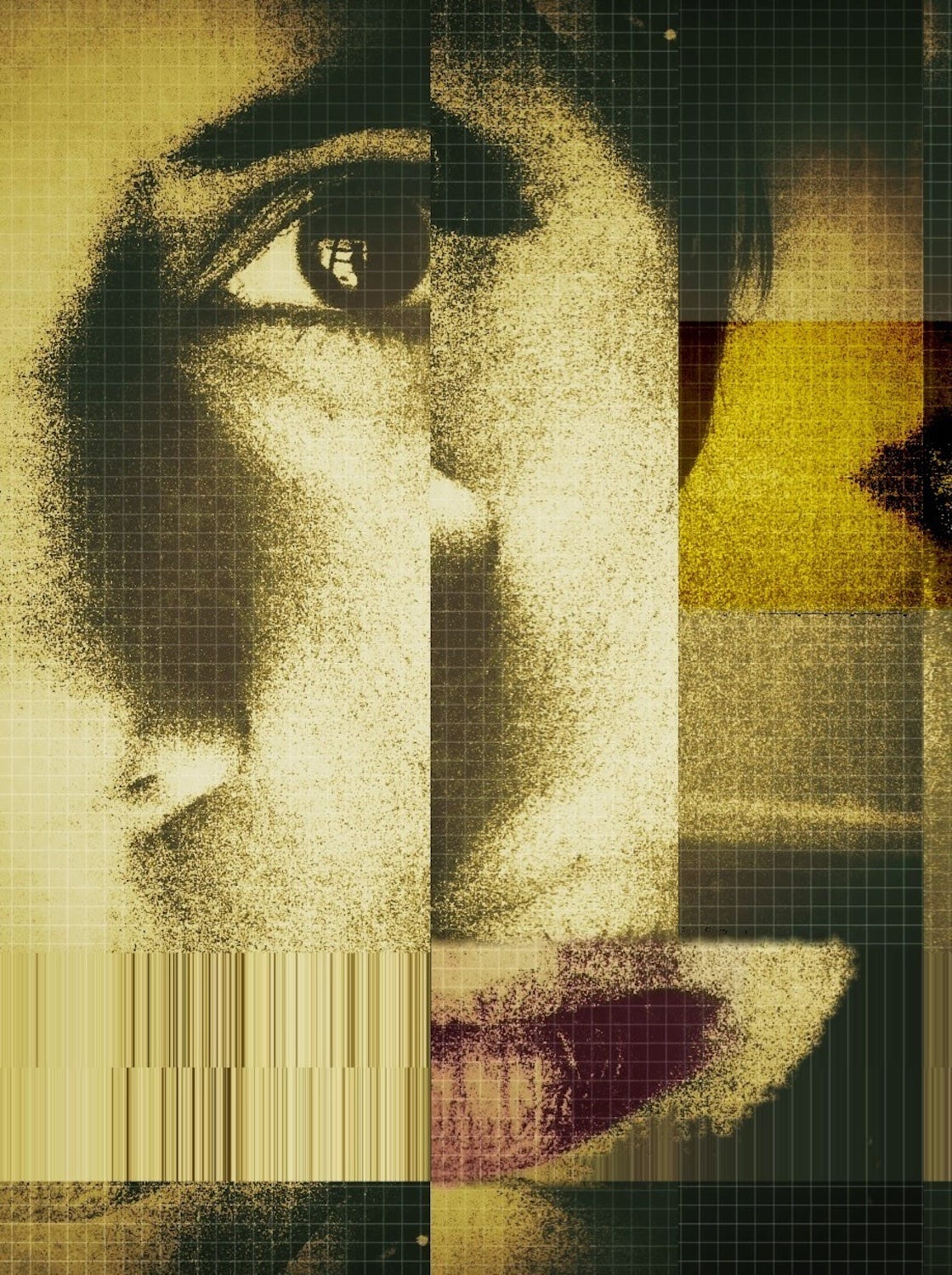The podcast/audio version in a more conversational style is available here.
Today, I am sharing with you what it means to me to be a misfit. And it starts with my earliest memory — my own memory, not a manufactured one handed down my parents. No. This one is mine.
It’s from when I pooped in first grade. I knew it had happened and hoped nobody would find out. Sure enough, a minute or so after the accident had occurred, a kid shouted, “what's that stink?”
I played dumb as our middle-aged, Anglo-Indian teacher with short steel gray hair marched down the rows of desks, her glasses perched precariously on the edge of her pointy nose. Her sharp eyes scanned the students, her nose twitching as she inhaled deeply with each step. “Oh my God!” she screamed disgustedly as she approached me and then promptly hailed the aayah — the custodian for kids in nursery school.
I waddled my way across two buildings during recess, two steps behind the aayah, who had very dramatically covered her nose with the loose edge of her blue cotton sari. She led me to the restroom where her job was to change dirty diapers. I’ll spare you the details … but after an awkward 10 minutes, I was deemed clean enough to go back to the classroom sock-free and underwear-less.
I was six. Nobody wanted to be associated with the “poopy kid.”
The next four grades were uneventful and unremarkable until I became the first kid in our class to get her period. I was 11 and entirely unprepared. We hadn't learned about menstruation at school. My mom obviously had never discussed it with me. In fact, I remember coming home at 1 p.m. and discarding soiled bloomers every hour for four hours until mom came home from work and I declared “I have blood cancer!”
Silence.
She gestured for me to follow her to her bedroom, pulled out a roll of cotton wool from her closet and patted it down to make a rectangle.
“Go put this in your bloomers,” she said. “You're a woman now. No more playing with boys!”
That was it.

That was my introduction to — and almost entire explanation of — periods. No questions were entertained. No reference material provided. I was nonchalantly told that this would last 5-to-10 days, occur every month, and just for this first time I could stay home for one day with a hot water bottle for company.
When I went back to school armed with a letter of absence, Miss Srivastava, our 20-something teacher, decided to read the letter out loud to the entire class.
At that time in India, a girl on her period was treated the same way the “untouchables” (members of the lowest caste) were. You didn’t enter the kitchen, you washed your own clothes, you hid in your room. No one would sit with me during recess for the next two weeks.
Fast-forward a couple more grades … I used to have luscious, thick, long hair that went all the way down to my lower back. But I was blessed — am blessed — with that hair every where … and it would stick out through the knee-length socks of our Catholic school uniform. Every time I pulled up my socks, it would create static! They called me Bhaaloo, which is the Hindi word for bear.
I share these vignettes as a way to illustrate how, over the years, I felt a whole lot of shame and awkwardness at school. Not just because of these three “iconic” events but because of an undercurrent of isolation.
I was the only, only child in my class.
My classmates bonded over complaints about annoying brothers and pesky sisters or tales of secret alliances and shared adventures. They harbored a conflicting blend of jealousy and sympathy towards me.
But I had clarity: I never wanted another human to be part of the mess I had to call home. I didn't pine for an older brother or younger sister. I liked my little cocoon of peace. I enjoyed my quiet reading time when my parents bickered. I preferred solitude. I didn’t need anyone’s pity or envy.
Perhaps, just a touch of acceptance?
But they didn’t know how to give me that because I was such an anomaly.
Where you saw a slew of vibrant silk sari-donning housewives cheering their daughters on at concerts, basketball games, swim meets and elocution contests, you’d see one man in his sharp suit and satin tie. My dad.
He was a freelancer … my mom a bank manager with a rigid schedule.
Let me reiterate this: my mom was a bank manager. She had a job.
Unlike my classmates, I never once got picked up from school by my mom. My lunch had been prepped in the morning and fresh rotis (tortillas) were cooked by the maid. Sometimes dad would join but most times I ate alone, book in hand.
No one else in my peer group had those experiences. No one could relate.
It made me very aware of how different I was … I didn't know the word misfit at the time, but I didn't feel that I belonged with any group, clique or posse.
I had realized early on, I was always going to be on my own.
I, me, myself.
A square peg
Jumping ahead to college where I became the only girl with braces. Again, not a commonplace thing in the 1990’s in India. And definitely not when one was 17! Especially not when everyone assumed (correctly) the only reason I had to get them was to fix my “ugly” smile, so my parents could find me a suitable match.
Seemingly little things like these took a big hit on my self-esteem, which was very low to begin with.
Different. Weird. Loner. And a host of other adjectives followed me to Iowa where I came for my master’s degree in journalism in 2002.
And right away I knew I wouldn’t belong … there was a group of Indian 20-somethings sticking together at orientation. Everybody was going to either engineering school or business school. And then there was me. A fish out of water.
They supposed it was a good thing my fiancé was an engineer!
I would visit him in California every other month — him and his bachelor housemates, all of whom were also engineers.
Lots of social awkwardness followed. I remember them pigeonholing me as a future technical writer when they realized I was majoring in journalism. They were in their Silicon Valley bubble and I was decidedly a foreigner.
I moved here permanently two years later, which coincided with a wave of arranged marriages within our social circle. My excitement for new female friendships quickly dissipated when I discovered our interests and perspectives were very different.
At social gatherings, a predictable pattern emerged: The men would gravitate to the living room, beers in hand, engrossed in conversations around their shared profession or the stock market. Meanwhile, the women — all homemakers — would retreat to one of the rooms to discuss recipes, Hindi soap operas or the excitement of their newly-married lives.
I was out of my depth. I didn't know how to cook. My mom had never taught me. Perhaps, she didn't have the time or she felt like I needn't learn because I would, eventually? Perhaps, because the kitchen was her sanctuary and she didn't want me disrupting her stolen moments of silence. Regardless, I had no culinary skills and couldn’t care less about Hindi soap operas or bedroom gossip.
But I suffered through many an evening because I didn’t want to be brandished as having a “better than thou” attitude.
It was a couple of years before I figured out, I could just excuse myself and get a drink. And I have my husband — my chief encouragement officer — to thank for that. Tequila shots? I was up for those! Wine tasting? Let’s do it! Beer-chugging contests? I’ve got you beat!
Who knew it could be fun hanging out with the guys when they weren’t talking engineering? But it came at a cost — none of the women drank alcohol. They hadn’t been raised “that way.” And they remarked, sometimes openly but mostly in hushed tones, at how socially awkward I was. Perhaps, because I was an only child? Perhaps, because my mom worked? Perhaps, because no one taught me how to be…?
Thankfully, the focus promptly shifted from grooming me to nurturing their own little ones. The segregated dinner parties continued but I wasn’t in limbo anymore. I was more than happy to offer my services as a babysitter. What a relief to find my sanctuary in those toothless smiles and belly laughs! I’d feed them, play with them, take them out for walks. The best part? I didn’t have to have any conversations with either set of adults. It felt right. I fit in. For the first time.
But a very short time … children do have a tendency to grow up, you know.
….
As transplants, each one of us was looking for community. My husband found an inbuilt one in his batchmates. The wives found it in other spouses with similar backgrounds. All the “friends” I had were inherited. Who were my friends? Where did I belong?
When I was working a desk job, whether it was for the foster care agency, or in academia, or the nonprofit health organization, I never had what I would consider friends. They were always co-workers. The version of myself I presented professionally was carefully curated, leaving little room for vulnerability or intimacy.
Becoming a mom at 35 triggered another round of self-doubt and adjustment: Did I belong with younger first-time moms or experienced mothers my own age that didn’t fret about or celebrate every little thing?
The transition from professional to stay-at-home mom had been hard enough but then I also found myself navigating the world of art and being immediately intimidated.
These folks had formal training, years of experience, and showed at prestigious exhibitions. Imposter syndrome hit hard as I questioned if I could even call myself an artist.
Where did I belong?
Alone, not lonely
When she was in first grade, our daughter came home one day and asked who my best friends were growing up. I had friends, but never felt kinship … that feeling of having someone I could call my safe place. I drew a blank. I think it was hard for her to understand why you can’t just give someone a BFF bracelet and call it a day? But now, at 10, she's grasping the nuances.
Friendship means different things to different people and evolves over time.
And sometimes, you outgrow some friendships. You just have to let them go.
Sometimes you just don’t find that one person you can have deep, soulful conversations with and also be silly and whimsical with. I've only ever felt that with my husband of 23 years. Our connection is deep, but even so there are parts of me I haven’t shared with him.
I've also grown in different ways since I became a mother. The common ground between us has shifted.
The realization I’ve arrived at, though, is that I don’t feel lonely. And I don't feel the need to fit in.
Despite my newfound sisterhood in the art community, I haven’t experienced a deep bond or a soulful connection with any one woman over a sustained period of time. Despite our common interests and personalities, all of them see a version of me that I am comfortable presenting to them. And I think that's true for all of us. Nobody will ever know the entirety of us.
It’s just not possible.
In the past, I have forced myself to be less or to think less in order to fit in while at the same time striving constantly to be more and do more for the people that mattered. I have never been able to answer a simple question of “who are you?” with a label. Because I’ve never just been one thing … These days, I am a creativity facilitator because I believe that I can encourage women to come out of their shells and find their liberated, empowered and authentic identities through the art they create.
But, what I am has nothing to do with what I do for a living.
The only thing I have always been is a misfit, an outlier, a free spirit. And it's been the most comfortable place for me to be.
As an immigrant, first from another country and then from another state, as a person who has never really identified closely with any particular group of people, whether they were from the Indian subcontinent or Iowa or California, I think I've ultimately found home.
And it's within myself.
It's been a very painful, albeit privileged, journey to get to this point, and I'm grateful for all those ugly experiences. I don't need others to make me feel good about myself. I'm okay with me. I am flawed. I am broken. I am severely damaged. But this is me.
All of us want social acceptance and to feel loved but I think the most important thing we can do for ourselves is to give ourselves that love.
It starts here. It starts with us. It starts with you. It starts with me.
I have tried so hard for years and always failed to meet someone or the other's expectations of who I should be … which has led to utmost disappointment in myself. I’m exhausted of trying to please others. To make them feel comfortable.
I am done. And I will remain unapologetic about it.
I wonder if this will prompt you to ask, is this what I really want to do? Is that what really brings me joy? Who am I doing this for? Ask yourself these questions. Ask them often. And, remember to give yourself the love you deserve … stop waiting for someone else to love all parts, all versions, ALL of YOU.
You are your own home.
Take care, be well, and I will see you next time for some more messy truths and self-reflection.











Mansi, thank you. I had some of the same very difficult experiences, and feel deeply for you (and me) with love and compassion. If I were with you right now, I would make us a pot of tea and share gratitude for where we are now, respecting and honoring who we were in those days, and look forward to who we will each become as the days go by. I’m so grateful for you and the help you have given me (and others!) in various ways. Many blessings ~
Thank you for sharing this. As a late bloomer (very very late lol) my case was handled with much more empathy. I am assuming it was thanks to your experience that this change was made. Thank you for sharing your experiences!